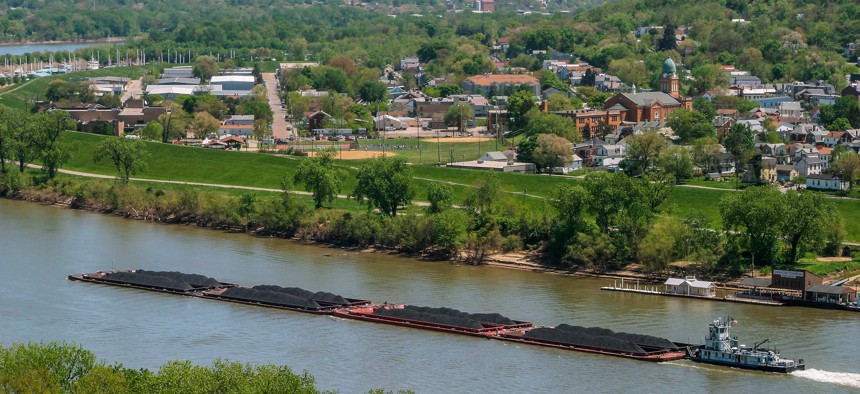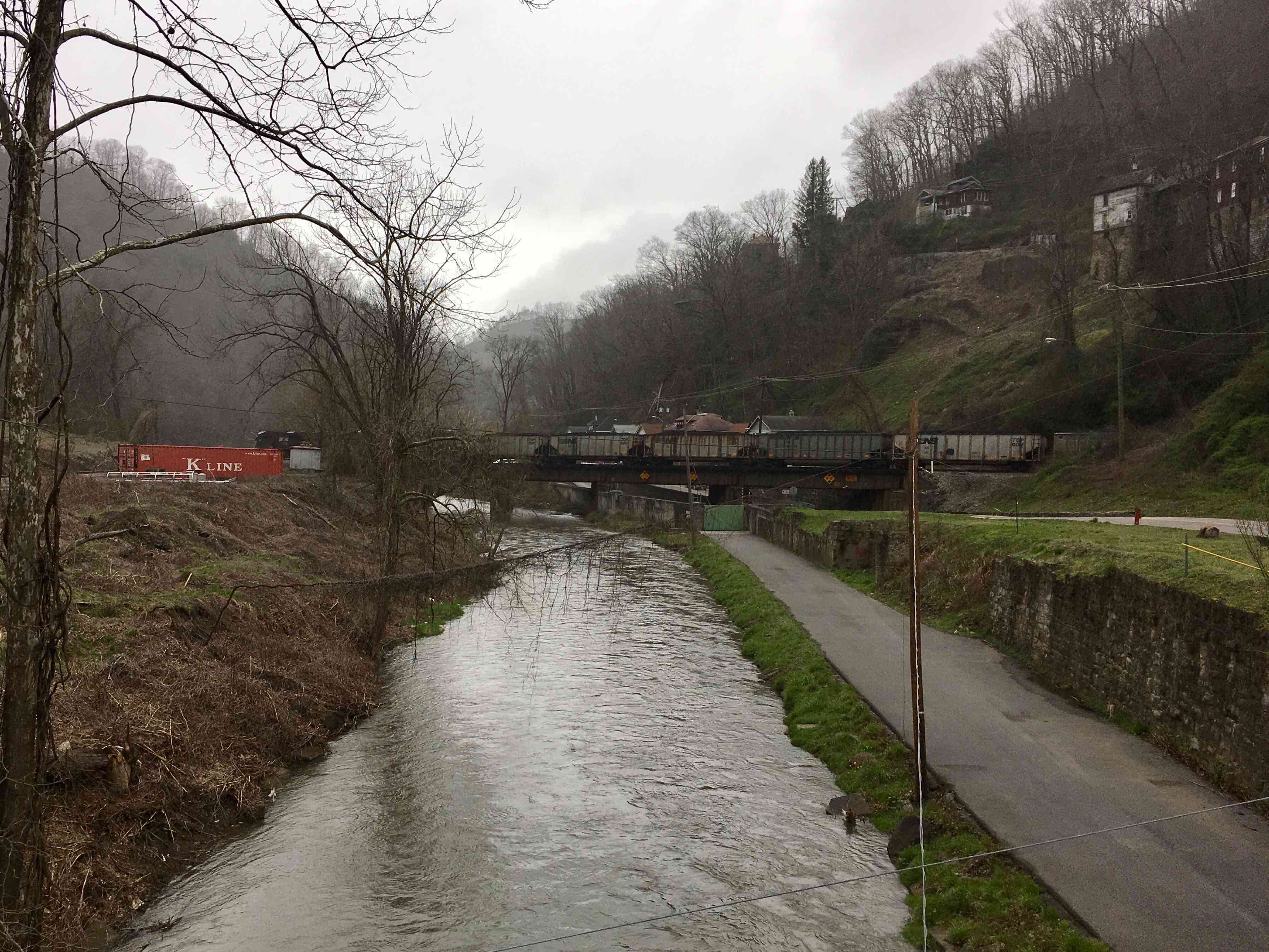The New Plans to Remake Appalachia’s Economy

Coal barges are pushed by a boat on the Ohio River. Shutterstock
Mayors from the region and others want the Biden administration to embrace their proposals for billions of dollars of spending, with a heavy emphasis on clean energy projects, as a way to reinvent the region as coal declines.
Mayors and progressive groups in four Appalachian states are lining up behind a pair of plans that envision transforming the region’s economy through billions of dollars in new public and private investment in clean energy infrastructure, manufacturing and other projects.
Their proposals aim to create thousands of jobs, many in industrial and building trades, while also meeting climate goals and positioning the region to thrive in future years as the demand for fossil fuels fades. The efforts are focused in and around the Ohio River Valley, across an area spanning the states the mayors are from—Kentucky, Ohio, Pennsylvania, and West Virginia. It's a part of the country that has long grappled with economic fallout from declines in coal mining, steel-making and other heavy manufacturing.
Both plans incorporate targets to drastically cut carbon emissions in the region by 2050 and, in doing so, seek to strengthen ties between urban and rural areas. Supporters of the Reimagine Appalachia campaign, one of the two proposals, especially stress that many of the new jobs they envision must be union, and make a case that this will yield fairer wages and benefits, while providing opportunities for apprenticeship and training programs.
The idea with the plans is that a city that is, say, looking to buy electric buses, or renewable energy, should be able to turn to a vehicle manufacturer or power facility in the region to meet its needs. In this way, a city like Pittsburgh—now far along the path to reinventing itself after the painful collapse of the local steel industry around the early 1980s—could play a key role in driving the economic revival in nearby smaller towns and rural areas.
“Finding ways to advance Pittsburgh further in the 21st century is really going to require stronger connections between our urban, suburban and rural communities,” said Grant Ervin, chief resilience officer for the city of Pittsburgh. The Ohio River originates where the city's downtown comes to a distinct point, at the confluence of the Monongahela and the Allegheny rivers.
Ervin noted struggling towns south of the city along the Monongahela River, like Monessen and McKeesport. “A lot of these communities—Pittsburgh included,” Ervin added, “the hallmark has been in the fossil fuel economy. And we recognize that that is not going to be the future.”

What the mayors and other groups are calling for aligns with the infrastructure and climate platform put forward by President-elect Joe Biden. But how much progress Biden will be able to make on that agenda remains to be seen with a closely divided Senate that Republicans have a good chance of retaining control over after two January runoff elections in Georgia.
For skeptics, it is easy to scoff at the idea of ambitious new economic development plans in Appalachia, a region where initiatives large and small have been trotted out regularly over the years only to fizzle, or to be carried out in ways that haven’t yielded promised results.
But advocates say the region cannot afford to sit on the sidelines of national debates about infrastructure, climate and other issues.
“There were so many conversations nationally about adopting national climate change legislation,” said Amanda Woodrum, a senior researcher with Policy Matters Ohio. “But those conversations were being largely driven by folks on the East and West coasts.”
“There’s obviously significant implications for our region,” she added. “We need to be at the table or we’ll be on the menu.”
Poverty, opioid addiction, ailing water systems, pollution and degraded land are some of the problems that have bedeviled parts of Appalachia. However, the towns and mid-sized cities there have many assets as well—a highly skilled workforce from mining and other sectors, industrial sites ripe for repurposing, rail lines and rivers, natural beauty and leading universities.
“Let’s change the narrative. From one of hardscrabble, Rust Belt place of despair, to a region of opportunity and possibility,” said Ervin. “That is the place that we want to be able to pivot to, not just as a collection of cities, but as a region.”
‘We Need to Prepare’
Pittsburgh Mayor Bill Peduto, along with the mayors of Louisville, Kentucky, Huntington and Morgantown in West Virginia and the Ohio cities of Youngstown, Dayton, Columbus, and Cincinnati, have put forward a proposal they’ve dubbed the Marshall Plan for Middle America, a reference to the American-backed rebuilding program in Europe after World War II.
The eight mayors, all Democrats, signed onto an op-ed in The Washington Post last month describing their plan.
Huntington Mayor Steve Williams said in a recent interview that he’s not against coal mining, or natural gas drilling, and that he supports looking for new ways to use coal that might fit with the changing economy. He noted that his grandfathers worked in coal mines, as did his father for a time before going on to college.
“I am what I am today because jobs were created through the coal economy,” he said.
But Williams also recognized that demand for coal is down and not showing strong signs of a rebound. Coal-fired power plants are closing as utilities increasingly turn to cheaper natural gas and renewables. While some people are upbeat about the market for coal from West Virginia that’s used in the production of steel, the overall outlook for U.S. coal mining is lackluster.
“The markets are speaking,” Williams said. “We need to prepare ourselves.”

A “roadmap” for the mayors’ Marshall Plan outlines $1.2 trillion of government and private investment in energy efficiency and clean energy infrastructure over 30 years, with about $60 billion spent annually over the next decade.
This money would support the build out of solar, wind and other renewable energy facilities, as well as updating the region’s power grid, getting more electric vehicles on the road, expanding and improving mass transit, and retrofitting buildings and industrial sites.
The Marshall Plan roadmap, put together by the University of Pittsburgh’s Center for Sustainable Business, estimates investment on this scale could create around 410,000 jobs across the four states. Investing with a long-term plan to create these jobs, the report says, would allow for a smoother transition away from declining fossil fuel industries and would be better than governments responding to layoffs and other economic crises on an ad hoc basis.
Alongside the mayors’ plan is the Reimagine Appalachia campaign, which is in many ways similar. It is being pushed by a number of progressive think tanks, including Policy Matters Ohio, the group Woodrum works for, and has the endorsement of dozens of environmental and community groups across the Ohio River Valley.
Stephen Herzenberg, executive director of the Keystone Research Center, one of the groups behind Reimagine Appalachia, said the idea is for a climate and regional development proposal that is better suited for the Ohio River Valley than something like the Green New Deal. Plans like that, while embraced by some progressive Democrats, are simply “dead on arrival in this region,” he said.
“They’re just crafted and messaged in a way that’s insensitive to the economic realities and struggles,” he said. “We knew we had to craft a framework that makes the case that this is absolutely an economic strategy that will create opportunity, not destroy jobs.” What’s become more apparent to more people in the past few years, Herzenberg added, is that addressing climate change has the potential to “create a lot of trades jobs” and industrial-type jobs.
In addition to investments in the power grid and renewable energy, the Reimagine framework pitches Appalachia as a potential hub for manufacturing goods like electric vehicles and alternatives to single-use plastics. It also stresses the need for remediating abandoned coal mining lands and waste sites, capping “orphaned” gas wells, and proposes reviving the New Deal-era Civilian Conservation Corps to do environmental restoration work.
The Reimagine proposal emphasizes building a union workforce, and says that jobs created from public investments should give priority in hiring and training to coal workers, as well as minority groups that have dealt with past discrimination. It also calls for state and local governments to create community advisory boards to set priorities for publicly-funded projects.
Woodrum underscored that the Reimagine Appalachia effort is not about “relocating and retraining our workers for jobs they don't want, in places they don't want to go.” In this way, the proposal differs somewhat from past programs geared toward retraining out-of-work coal miners to write computer code or drive trucks, often leading to jobs that aren't available nearby or that don’t pay as well as mining.
“We actually need our coal and fossil fuel industry workers, for instance, to help us build the future that we want to live in,” Woodrum said. The goal now for her group and others, she said, is to forge something new that is equivalent to the well-paid work tied to mining and coal-fired power plants, which went a long way toward keeping local economies afloat.
Woodrum said people involved with Reimagine Appalachia have had conversations with Biden intermediaries. They’ve also been in contact with Democratic Pennsylvania Senator Bob Casey’s office about the proposal to bring back the Civilian Conservation Corps, she said. “There’s a real opportunity, I think, with the Biden administration to put their money where their mouth is,” Woodrum added. “This region has been a political stumbling block for decades.”
Prospects for Investment
The mayors and the Reimagine Appalachia groups are looking for a major infusion of federal cash to fund their proposals. But there are other ideas about where some of the money might come from.
In October, Heartland Capital Strategies, a Pittsburgh-based investment organization with strong union ties, helped convene an online event where Marshall Plan and Reimagine Appalachia advocates, along with others, came together. Heartland works to drive investments that benefit regions and workers and that support environmental, social, governance, or ESG goals, an area that has gained attention in recent years among investors.
The October event featured presentations about investments that are happening around the U.S. that are along the lines of what’s discussed in the two Appalachia proposals.
One example that Thomas Croft, Heartland’s managing director, highlighted during a recent interview, involves the city of Cincinnati entering into a deal announced last year to purchase power, at a fixed rate over 20 years, from a newly constructed, roughly 1,000-acre solar farm about 40 miles east of the city in Highland County. Croft noted that the city joined with union-friendly developers to do the project.
“Part of what we want to explore is could multiple cities aggregate even larger sort of demand for solar, for wind, for water, for things like electric buses,” Croft said.
He also raised the possibility that municipal pension funds, which invest employee and employer contributions in a range of assets to generate returns that help them pay the benefits they owe to retirees, might be able to pool capital that could be invested in these types of projects. There are opponents to pensions treading into this sort of territory, who have argued that doing so could risk weakening the returns that keep the retirement funds solvent.
Croft walked through a list of other investments by members of Heartland’s investor network that appear to fit with what the mayors and Reimagine Appalachia groups are trying to do.
For instance, Ullico, a labor-owned insurance and investment company, has secured roughly $3 billion for an infrastructure investment fund. That fund, as of September, had 18 investments in sectors like renewable energy, natural gas generation, electricity transmission and water facilities. Ed Smith, president and CEO of Ullico, described the fund at the October event.
There’s also GCM Grosvenor, which manages about $59 billion in assets. In September, it announced it had raised $893 million for a “Labor Impact Fund” that will invest in infrastructure projects “that leverage the inclusion of union labor.” Grosvenor earlier this year said that, as part of its labor impact program, it would provide $85 million in debt financing for a project in Bakersfield, California to retool an oil refinery to make renewable diesel biofuels.
“This work is massive and it’s coming,” Croft said of clean and renewable energy projects. Meanwhile, he noted, Appalachia has suffered from deindustrialization and boom and bust cycles with industries like mining and steel for decades. “We ought to be putting our house in order,” Croft said. “And not just jumping on the next popular thing that doesn’t have long-term sustainability.”
‘Old Conversation’
Ron Eller, former director of University of Kentucky’s Appalachian Center and the author of books examining the history of development and industrialization in the region, said when he read the mayors’ op-ed about their plan, it rang familiar. “It’s exactly the same perspective, exactly the same debate, that was presented in the 1950s,” he said.
While some of the terminology and the focus on clean energy are new, Eller added, “this is an old, old, old conversation and an old, old, old proposal.” The roots of the issues in play can be traced even back to the New Deal era of the 1930s and disagreements then about the use of federal aid to build and restore regional and local economies.
Eller noted that Democrats backed legislation in the 1950s seeking to revitalize cities in Middle America experiencing industrial declines and high unemployment. But those efforts were rebuffed by President Dwight Eisenhower, a Republican, who objected to federal intervention in the economy on the scale that had been proposed.
Regional development programs gained traction during John F. Kennedy’s time in the White House and under President Lyndon Johnson and his Great Society agenda, Eller explained. In Appalachia, he said, federal initiatives during the 1960s and, in later years, helped with upgrading highways, housing and water and sewer systems.
Many of these programs did a lot of good, he said. And groups like the Appalachian Regional Commission have figures showing how the number of economically distressed counties declined in the area over the decades. But everyone did not share in the benefits equally, and poverty and economic hardship persist, particularly in rural communities and among working class residents.
“I’ve been arguing for 30 or more years that what we need to begin to do is to find ways to bring rural communities and urban communities together in the decision making process,” Eller said. “So that the development initiatives in urban areas can benefit the rural areas and vice versa.”
He applauded the new proposals. But he said the initiatives should concentrate on long-term planning, over 10 to 15 years, and engaging citizens and grassroots leaders to determine how they want their communities to evolve over that timeframe. Thinking broadly, and involving people in fields like health care and higher education is important, too, he said. Eller highlighted past efforts in western North Carolina as tobacco declined as a possible model to look at.
One common trait of communities and regions that adapt to shifting economic forces is nurturing creativity, Eller said, rather than saying: “we need to create jobs in one sector.” “We certainly need to move in terms of alternative energy and there’s a lot of potential,” he added. “But the energy sector in itself is only one small element of comprehensive economic development.”
Bill Lucia is a senior reporter for Route Fifty and is based in Olympia, Washington.
NEXT STORY: Group rates states’ IT modernization work






